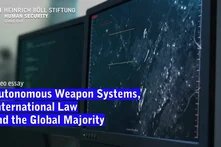Global Peace & Security
Dossiers
Articles
Show more articles about Global Peace & Security (101)
Publications
Show more publications about Global Peace & Security (60)
more pages about Global Peace & Security
© Heinrich-Böll-Stiftung e.V.
Schumannstraße 8
10117 Berlin
T +49 (30) 285 34-0
F +49 (30) 285 34-109
www.boell.de
info@boell.de
















